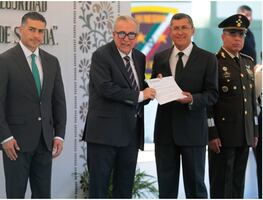Más Información

Videojuegos, el nuevo gancho del crimen para captar menores; los atraen con promesas de dinero y poder

“Vamos a dar apoyo a los pequeños agricultores por sequía en Sonora”; Claudia Sheinbaum instruye a Berdegué

Derrota de México en disputa por maíz transgénico contra EU; estos son los argumentos de Sheinbaum y AMLO para prohibirlo
Central
American asylum seekers
sent to Mexico by the United States to await their U.S. court dates increasingly become the victims of kidnappings and other types of violence , aid group Doctors Without Borders said in a report published on Tuesday.
In a bid to slash asylum claims, the Trump administration launched an initiative in January 2019 that has forced more than 57,000 non-Mexican migrants to wait in Mexico for their U.S. immigration court hearings, under a program known as the Migrant Protection Protocols (MPP) .
MPP, sometimes called Remain in Mexico , is among various overlapping U.S. policies aimed at discouraging asylum seekers. Critics say the program has put migrants , most of whom are fleeing violence and poverty in Central America , directly in harm’s way.
“Those who have been returned to Mexico... face serious risks and are systematically exposed to violence and potentially traumatic events,” said the medical assistance group, also known by its French name, Médecins Sans Frontières (MSF) .
MSF said that in September 2019 , nearly 44% of its patients sent to the Mexican border city of Nuevo Laredo under the MPP program had been kidnapped , and another 12% were victims of attempted kidnappings .
By October , the percentage of such kidnappings surged to 75% .

“According to the testimonies of these people, kidnappings could last several weeks, and they were occasionally forced to work for their captors ,” MSF said in its report.
Mark Morgan
, the acting commissioner of U.S. Customs and Border Protection , said during a briefing in Washington on Tuesday that the findings of the report did not reflect his agency’s understanding of the security situation for migrants sent to Mexico under the MPP program.
“Our staff has been to Mexico, I’ve been to Mexico,” Morgan said. “What I saw there is not what is being reported.
Morgan said only the perpetrators should be held responsible for criminal acts .
“That’s who we should be going after,” he said.
Morgan said his agency was working with the Mexican government to better direct migrants to remain in shelters and not go to border encampments where they might be more vulnerable to victimization.
The Mexican government did not immediately respond to requests for comment. President Andrés Manuel López Obrador has said he wants to apply immigration laws while respecting migrants’ human rights .
MSF
said its teams had witnessed kidnappings right outside shelters used by migrants in the city and at bus stations, and that pregnant women in Nuevo Laredo preferred not to leave the shelter to go to the hospital for fear of being kidnapped.
The vast majority of asylum seekers are attempting to escape violence and poverty in the region’s so-called Northern Triangle, comprising Honduras, Guatemala, and El Salvador.
“The violence suffered by people living in the Northern Triangle of Central America is comparable to that in war zones where MSF has been working for decades,” the organization said.
About 40% of the migrants and asylum seekers interviewed by MSF said they were violently attacked as they traveled through Mexico, while a further 27% said they were threatened or extorted .
“Central American asylum seekers and migrants find themselves with no way out, trapped by a series of barriers , in conditions that threaten their mental and physical health ,” MSF said.
The report was based on data and 480 interviews, mostly with people from the Northern Triangle , that the agency has conducted since January 2018 , MSF said.
“They’re treated as if they aren’t really people,” Sergio Martin , Mexico coordinator for MSF, told the Thomson Reuters Foundation . “They’ve suffered violence ... and what they find on their journey is more violence .”
Mexico has ramped up efforts to stop Central American migrants , often fleeing violent crime and poverty , reaching the U.S. border under pressure from President Donald Trump who threatened to put import tariffs on its goods.
It has deployed the National Guard to stop migrants crossing northwards and increased detentions and deportations .
“We think that as a direct result of many of these policies there are people who are suffering more violence,” said Martin .
“It’s easier for them to fall into human trafficking networks or into extortion networks , and no one looks for them.”
mp







